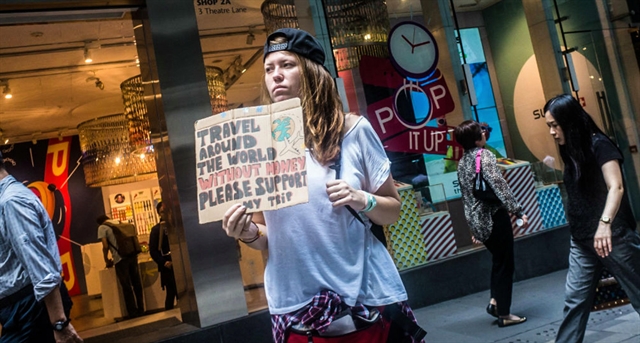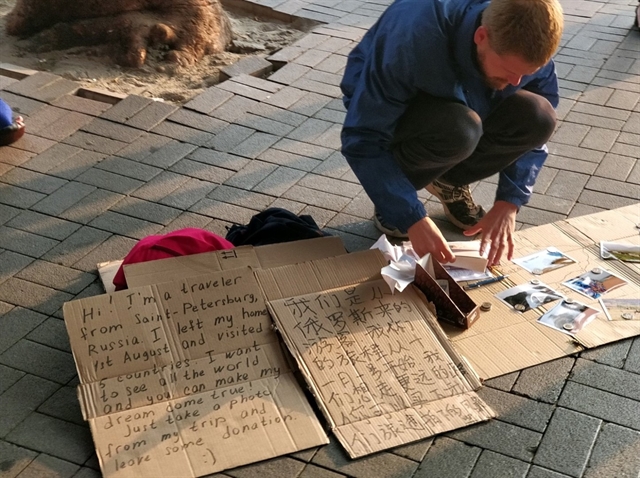 Life & Style
Life & Style

‘Begpacking’ is a common source of anger among expats in Việt Nam and across Southeast Asia. While many Asian cultures have a tradition of giving, the sight of Western travellers asking others to pay for their trips has caused significant outrage among tourists and long-term residents alike.

|
| Cash-strapped: A woman begs for money on a street in Bangkok. — Photo HKFP |
Ollie Arci
‘Begpacking’ is a common source of anger among expats in Việt Nam and across Southeast Asia. While many Asian cultures have a tradition of giving, the sight of Western travellers asking others to pay for their trips has caused significant outrage among tourists and long-term residents alike.
The issue has reared its head once again after Thai authorities announced new laws to stifle the practice and clean the streets of scruffy westerners.
The phenomenon has plagued the region for a few years, with photos and videos attracting social media vitriol from Hà Nội to Hong Kong, Bangkok to Jakarta. Despite confrontations and public shaming, the trend continues, with ever-cheaper flights making once inaccessible destinations just a day’s journey away. Combined with plummeting job opportunities in their own countries, is it any wonder today’s intrepid twenty-somethings are taking up the challenge of travelling on less-than-a-shoestring. So much less, in fact, that they expect passers-by to pony up?
The idea that somebody should deign to fund their travels through the charity of others, especially in a country where the average income is less than a tenth of the UK, is morally repugnant. The streets of Hà Nội are surprisingly free of panhandlers, in comparison with similar-sized cities in Europe and the United States. While the homeless do exist, they are more likely found working manual jobs for subsistence wages and living on the outskirts of town. In this context, the appearance of young, white and able-bodied backpackers canvassing for cash is jarring. In treating the local population as a piggy bank for the onward journey, the lack of cultural sensitivity is glaring.
The most recent, and perhaps egregious, example was of a Russian couple swinging their baby around on a street in Kuala Lumpur. The incident, filmed and shared on Facebook a few months ago, attracted swift criticism and thankfully a visit from Malaysian police officers.
Of course, not all begpackers are juggling infants for small change. There are those providing some sort of ‘entertainment’, those selling their holiday snaps, and others just propping up cardboard pleas for pennies. They’re usually drawn to areas with significant foot traffic, like Bangkok’s Khao San Road or Hà Nội’s walking streets.
Some may well be in dire need of funds after suffering an accident or other calamity. While some begpackers are, no doubt, taking advantage of the kindness of strangers, others are in genuine need. The first stop, however, should be the embassy, not the sidewalk. It’s certainly possible that the destitute backpacker you handed money to in the afternoon will be found knocking back cheap beers in the Old Quarter come the evening. But that’s true of all panhandlers.
Begging for change

|
| Snaps for sale: A man sells photos in Hong Kong. — Photo Twitter Qblx08 |
Measures are in place to put a stop to the practice. Begging on public streets is illegal in Hong Kong, while you shouldn’t be earning money on a tourist visa in Việt Nam. As mentioned, Thailand is taking steps to crack down on those begging around temples and other sacred sites with new laws and a firmer hand. But the problem persists, and it is more than just legislative.
What grates is the expectation that someone’s jollies will be sustained without much effort on their part. The expectation that strangers should contribute to another’s leisure for no reason at all. The ‘Gofundme Generation’ sees charity as a shortcut, a way to skip the inconvenient part where you earn money to have fun. On top of becoming a substitute for travel insurance, a fundraising drive takes little time, and soon you could be jetting off to your next stop.
It’s a privilege to be able to get on a flight and visit the other side of the world. The opportunity to experience another culture so different from your own is something that should be open to everybody. But not at the expense of others. The possibility of intercontinental travel is little more than a dream to many on the receiving end of the begpacker’s entreaties.
Of course, no begpacker is representative of an entire culture, and as such their behaviour should not be used to tar the rest of the expat community. Most of which work hard and earn an honest living to support their stay in Việt Nam – whether that be for a couple of months, or a lifetime.
Holidays and travel are a luxury, saved up for through labour and enjoyed all the more because of the preceding toil. I also know I am fortunate to live as an expat in a welcoming community. The value of labour has been drilled into me from an early age, and it’s galling to see some try and shirk that responsibility, to skip that sacred step of work to play. — VNS